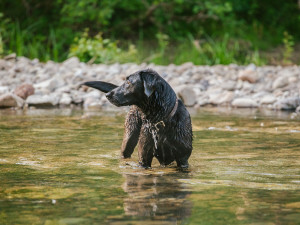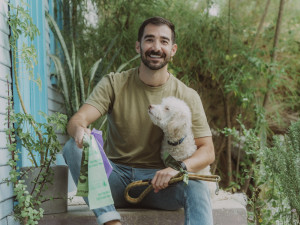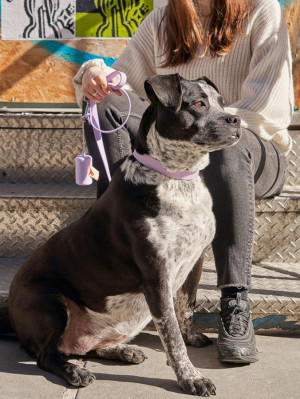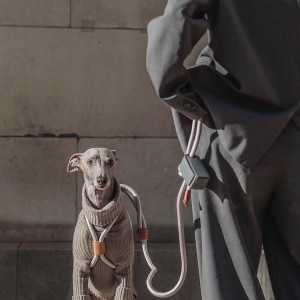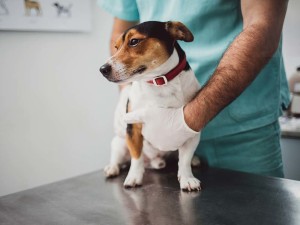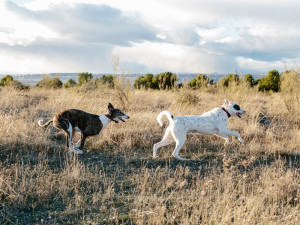No Sh*t: Why You Should Never, Ever Leave Dog Poop On The Ground
It’ll mess up a lot more than your pristine white sneakers.
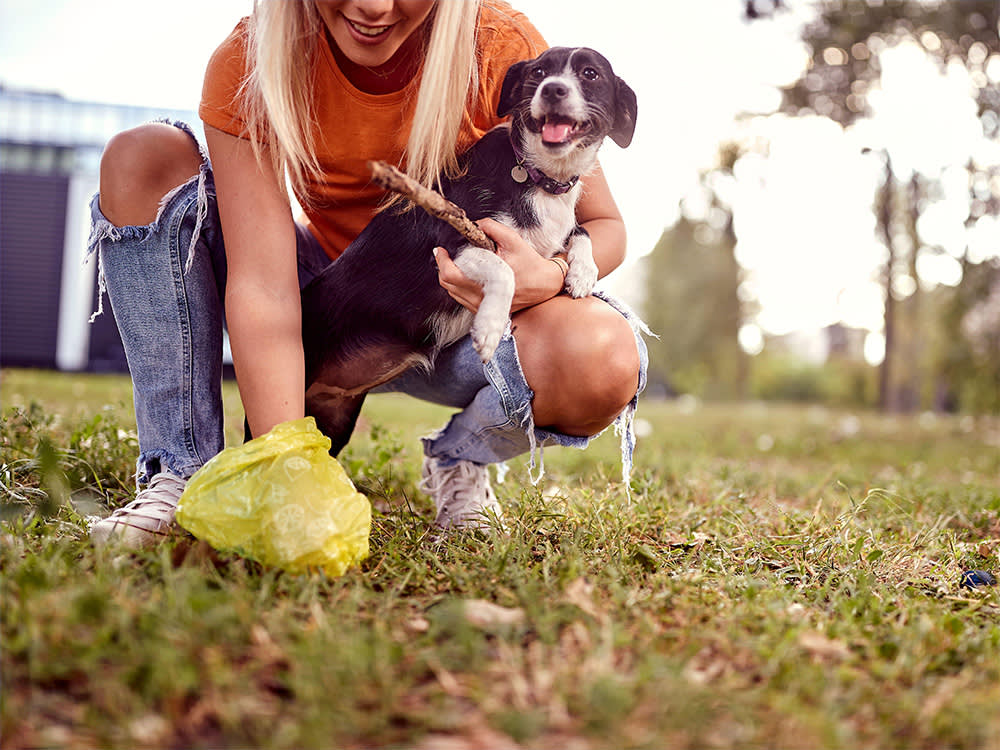
Share Article
We’ve all been there: You’re walking your dog when they decide to do their business in the least convenient place possible, far from a trash receptacle of any kind. This is not the ideal situation, and it’s one that, as a dog parent, you fear when you go out on every week. But it’s inevitable. At one point or another, you will be the person carrying a bag of dog poop with nowhere to throw it. Or you’ll be that dog parent who runs out of bags before your pup’s surprise two-poop walk.
So, what do you do now? You’re pretty sure nobody else is around so it’s fine to leave it, right? Not so fast. Beyond potentially ruining a stranger’s day (and sneakers), rogue dog poop can pose a risk to public health — and the planet.
Wait, why is it so bad?
For starters, dog poop is a breeding ground for germs. Research shows that it can contain opens in new tab potentially pathogenic, parasitic, or antibiotic-resistant microorganisms. Even if your dog doesn’t appear to be sick, their poo could containopens in new tab hookworms (Ancylostoma spp.), roundworms (Toxocara spp.), giardia, and other pathogens that contribute to zoonotic diseasesopens in new tab that pass from animals to people. Yum!
While the likelihood of a disease passing from dog poop to person is relatively rare, it does happenopens in new tab. Children, people with weak immune systems, and older folks are particularly at risk, and leaving dog poop in heavily trafficked areas, like city sidewalks, increases the likelihood of transmission.

That doesn’t mean you’re off the hook to leave waste in more remote areas, either. Think of your dog’s waste as a powerful fertilizer for the surrounding landscape. This may sound like a good thing, but the high levels of nitrogen and phosphorous in feces can actually throw off the balance and biodiversity of plant communities. The plants that the poo ends up near will rapidly absorb its nitrogen and use it to outgrow its neighbors, potentially causing plant species lossopens in new tab.
While animal poop is part of nature, too much of it can also throw off aquatic health. Once waste is washed into the water system, its high nitrogen and phosphorus can spur the growth of algae that’s toxic to fish and other critters. Pet waste is a surprisingly large contributor to “dead zones” — areas where algae blooms have used up available oxygen and blocked sunlight on the surface, making the water below inhospitable.
When researcher Dr. Pieter De Frenne spearheaded a study on dog feces and urine in nature reserves last year, he was surprised to find just how significant their impacts were. "Atmospheric nitrogen inputs from agriculture, industry, and traffic rightfully receive a lot of policy attention, but dogs are entirely neglected in this respect,” he said in a press releaseopens in new tab.
Moral of the story: Leaving dog poop on the ground is a really sh*tty thing to do, no matter where you do it.
How to clean up your act
Now, in case the eco-guilt has you wondering if there’s a more responsible way to part ways with poo besides just throwing it in the bin, unfortunately, the answer is no — at least for right now.
Even though animal waste emits potent greenhouse gases, like carbon dioxide and methane, as it sits in a dump, sending it to a landfill is still what the Environmental Protection Agency (EPA) recommends. That’s because, as Monique Figueiredo, founder of CompostableLAopens in new tab, told Kinship in a January 2022 interview, all the bacteria in feces make composting it difficult and potentially dangerous.
Because pet waste can’t be composted, this means compostable doggie bags are pretty useless, too. When those bags are sent to the landfill and not the specific conditions of an industrial compost facility, they’ll degrade just as slowly as all the other trash. Instead, Figueiredo recommends using repurposed or recycled baggies for waste collection. The next time you accidentally forget to bring your reusable tote to the store, keep the plastic bags you end up with to use for this purpose. Or, order poop bags that utilize recycled material, like GreenPollyopens in new tab or Hippo Sakopens in new tab, online.
All in all, the options we have for poo removal are woefully limited — especially when you consider just how much of the stuff cats and dogs leave behind annually: over 1.6 million tonsopens in new tab. Instead of accepting the crappy situation, we can support the rollout of new waste management systems, which the United States Department of Agriculture (USDA) likens to “miniature septic tanksopens in new tab,” in the parks and public spaces we frequent with our pets. That way, we can help shape a future that’s safer for people, wildlife, and white sneakers everywhere.

Emma Loewe
Emma is a writer, editor, and environmentalist based in New York City. She is the senior sustainability editor at MindBodyGreen, the author of Return To Nature: The New Science of How Natural Landscapes Restore Us (April 2022), and the co-author of The Spirit Almanac: A Modern Guide To Ancient Self-Care. Her writing has appeared in Grist, National Geographic, Civil Eats, and Outside Magazine, among others. While she doesn’t have any pets of her own, she is a loving dog aunt to Pip the pup.
Related articles
![Backview of a man in a dark grey suit with a leash and an attached poop bad holder that is attached to a greyhound dog in a grey sweater]()
9 Poop-Bag Holders That Will Save You in Any Dog Walk Emergency
When sh*t happens, you don’t have to be the one standing on the sidewalk without a plan.
![Collage of Dave Coast and his dog with white outlines]()
Dave Coast’s Favorite Sustainable Dog Products
The LA wellness guru (and his Poodle Stanley) vouches for recycled poop bags, bottle-opener collars, cruelty-free shampoo, celeb-approved dog beds, and more.
![A black dog with a tilted head looks attentively at the camera while sitting in grass.]()
Is My Dog’s Poop Normal?
From bloody poop to diarrhea—all your dog’s poop problems explained.
![feeding black dog rice water to help relieve diarrhea]()
Vet-Approved Diarrhea Treatments
Shudder. It happens to all of us.
![Veterinarian examining a dog]()
My Dog Has Diarrhea. Should I Call the Vet?
Certain symptoms could mean your dog is battling a potentially fatal condition called hemorrhagic gastroenteritis (HGE). Here’s everything you need to know.
![Two dog chasing each other playfully in a prairie field outside]()
Don’t Worry, But Dogs Can Get Cancer From Sniffing Other Dogs’ Nether-Regions
The gnarly scoop on canine transmissible venereal tumors.

